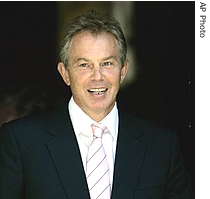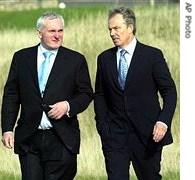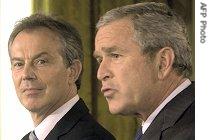-
(单词翻译:双击或拖选)
London
22 June 2007
British Prime Minister Tony Blair steps down June 27th after a decade in power during which he re-energized his Labor1 Party, embarked2 on an interventionist foreign policy and forged ever-closer ties with the United States. But, as Mr. Blair hands over the reins4 of power one damaging decision follows him out of office, his unfailing support for the war in Iraq. VOA's Sonja Pace takes a look at the Blair legacy5 in this report from London.
 |
| Tony Blair (File) |
After a sweeping6 election victory in 1997, Tony Blair promised a new direction.
"You, the British people have given us the chance to serve you," said Mr. Blair. "You have put your trust in us and we say to you - we shall repay that trust for you. We govern for you."
He promised to revitalize the country with a dynamic, efficient approach more in tune7 with the new global economy. He vowed8 more effective social programs and brought a new, relaxed style to Number 10 Downing Street.
But, it wasn't just style and an ability to connect with average people that made Tony Blair popular. Blair biographer Anthony Seldon says it was also plain political skill.
"He won more elections than any other Labor prime minister, he changed the face of the Labor Party, he produced peace in Northern Ireland after many years of fighting," he noted9.
The Northern Ireland peace process of 1998 came to fruition less than two months ago with the formation of a unity10 Catholic-Protestant government for the province. Mr. Blair was in Belfast to clinch11 the deal.
 |
| Britain's Prime Minister Tony Blair (r) and Ireland's Prime Minister Bertie Ahern |
Dealing12 with conflicts near and abroad became a cornerstone of Mr. Blair's interventionist foreign policy. In 1999 - he argued forcefully for the international community to intervene in Kosovo. And, Britain's military intervention3 in the West African nation of Sierra Leone in 2000 is credited with helping13 bring to an end a brutal14 civil war there.
Mr. Blair won a landslide15 second term in office in 2001, but then the world changed on September 11.
"The full horror of what has happened in the United States earlier today is now becoming clearer," he said. "It is hard even to contemplate16 the utter carnage and terror which has engulfed17 so many innocent people."
Mr. Blair stood with U.S. President George Bush, forging ever-closer ties between London and Washington. He was instrumental in making the case for action against al-Qaida in Afghanistan and went along willingly into Iraq.
 |
| George Bush, Tony Blair at White House press conference, July 28, 2006 |
While Mr. Blair is widely credited with having tempered the Bush administration's go-it-alone approach in the early preparations for Iraq, he has been harshly criticized for not being able to influence how the war and the aftermath were handled.
Michael Brown, former conservative member of parliament and now political columnist18 for the Independent newspaper, tells VOA, Iraq was Tony Blair's biggest mistake.
"His enduring legacy, in terms of British public life, will, I'm afraid be Iraq," he noted. "Iraq will be engraved19 on Tony Blair's political tombstone when the history books of his premiership are written."
Iraq took its toll20 on Mr. Blair's popularity and still - he won a third term in office in 2005, even though the Labor party took a beating. Then in July terrorist attacks on London's transport system claimed the lives of 52 commuters.
Speculation21 was rife22 that Tony Blair would not last to the next election scheduled for 2010. That speculation proved correct.
"Today, I announce my decision to step down from the leadership of the Labor Party," he said. "Hand on heart, I did what I thought was right. I may have been wrong, but believe one thing if nothing else, I did what I thought was right for our country."
It is too early to tell how Tony Blair will eventually be remembered, but for now Iraq casts a long shadow over his legacy.
 收听单词发音
收听单词发音
1
labor

|
|
| n.劳动,努力,工作,劳工;分娩;vi.劳动,努力,苦干;vt.详细分析;麻烦 | |
参考例句: |
|
|
|
2
embarked

|
|
| 乘船( embark的过去式和过去分词 ); 装载; 从事 | |
参考例句: |
|
|
|
3
intervention

|
|
| n.介入,干涉,干预 | |
参考例句: |
|
|
|
4
reins

|
|
| 感情,激情; 缰( rein的名词复数 ); 控制手段; 掌管; (成人带着幼儿走路以防其走失时用的)保护带 | |
参考例句: |
|
|
|
5
legacy

|
|
| n.遗产,遗赠;先人(或过去)留下的东西 | |
参考例句: |
|
|
|
6
sweeping

|
|
| adj.范围广大的,一扫无遗的 | |
参考例句: |
|
|
|
7
tune

|
|
| n.调子;和谐,协调;v.调音,调节,调整 | |
参考例句: |
|
|
|
8
vowed

|
|
| 起誓,发誓(vow的过去式与过去分词形式) | |
参考例句: |
|
|
|
9
noted

|
|
| adj.著名的,知名的 | |
参考例句: |
|
|
|
10
unity

|
|
| n.团结,联合,统一;和睦,协调 | |
参考例句: |
|
|
|
11
clinch

|
|
| v.敲弯,钉牢;确定;扭住对方 [参]clench | |
参考例句: |
|
|
|
12
dealing

|
|
| n.经商方法,待人态度 | |
参考例句: |
|
|
|
13
helping

|
|
| n.食物的一份&adj.帮助人的,辅助的 | |
参考例句: |
|
|
|
14
brutal

|
|
| adj.残忍的,野蛮的,不讲理的 | |
参考例句: |
|
|
|
15
landslide

|
|
| n.(竞选中)压倒多数的选票;一面倒的胜利 | |
参考例句: |
|
|
|
16
contemplate

|
|
| vt.盘算,计议;周密考虑;注视,凝视 | |
参考例句: |
|
|
|
17
engulfed

|
|
| v.吞没,包住( engulf的过去式和过去分词 ) | |
参考例句: |
|
|
|
18
columnist

|
|
| n.专栏作家 | |
参考例句: |
|
|
|
19
engraved

|
|
| v.在(硬物)上雕刻(字,画等)( engrave的过去式和过去分词 );将某事物深深印在(记忆或头脑中) | |
参考例句: |
|
|
|
20
toll

|
|
| n.过路(桥)费;损失,伤亡人数;v.敲(钟) | |
参考例句: |
|
|
|
21
speculation

|
|
| n.思索,沉思;猜测;投机 | |
参考例句: |
|
|
|
22
rife

|
|
| adj.(指坏事情)充斥的,流行的,普遍的 | |
参考例句: |
|
|
|















